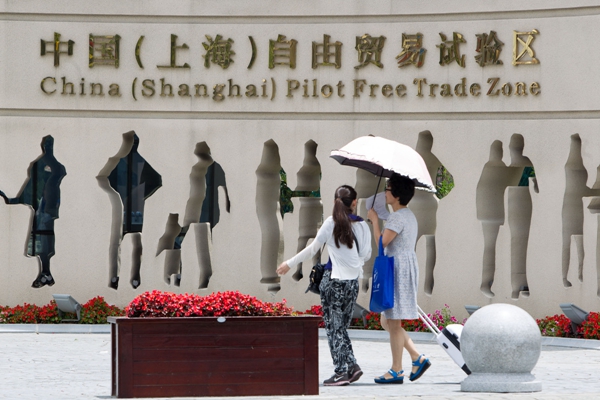Shanghai strives to deepen opening-up

Pedestrians walk past the entrance of the China (Shanghai) Pilot Free Trade Zone. [Photo by Wu Jun/For China Daily]
Shanghai will deepen the financial reforms and innovation in China (Shanghai) Pilot Free Trade Zone (FTZ), to further opening-up and explore the free receipt and payment of cross-border capital.
"The Shanghai FTZ, established in 2013, now focuses on building a new area that will be more open and serve as a specific economic zone. We will work for enhanced opening-up measures, improve capacity of risk and pressure resistance, and pioneer the free cross-border receipt and payment in the country," said Zheng Yang, head of the Shanghai Financial Service Office.
Shanghai FTZ has created 111 Chinese firsts in the field of financial innovation, setting examples for other areas.
Furthermore, Shanghai has applied three batches including 31 financial opening-up projects to the State Council and national financial authority, with 17 projects already approved. The city is now planning for the fourth batch of projects.
Besides, Shanghai will strengthen the coordination of finance monitoring policies for the Yangtze River Delta region, promote the region's uniformity of finance service standard and level, and pioneer to achieve the integrated development of the Yangtze River Delta region in the sci-tech innovation and financial service sectors.

Pedestrians walk by a line of financial institution signs in Lujiazui, a central business district of Shanghai. [Photo by Sha Lang/for China Daily]
With continuous efforts, Shanghai has taken a lead in financial opening-up in Chinese mainland and launched various innovative financial products, including Shanghai-Hong Kong Stock Connect, International Board of Gold, Bond Connect, Oil Futures and Free Trade Account.
"Shanghai has established its status as one of China's top financial centers, focusing on financial market system, and has built international centers for RMB product innovation, transaction pricing and clearing," Zheng noted, adding that there is still a gap between Shanghai financial center and world leading financial centers.
The gap lies in that Shanghai offers complete market services and enjoys high transaction volumes, but lacks diversified product varieties, discourse power and pricing power in the market.
Meanwhile, Shanghai has to further exert its effect around the world and optimize financial environment to attract more finance talents.
The future several years will be crucial for the construction of Shanghai as a world financial center.
On one hand, Shanghai needs to prioritize building an onshore renminbi business center, in a bid to transform Shanghai into a global center for RMB market and business.
On the other hand, Shanghai will focus on the Asia-Pacific area, as it is most possibly to develop a new international financial center.
The move aims to help Shanghai occupy a vantage point and turn itself into one of the world's top financial centers, on par with London and New York.
 Contact Us
Contact Us

 Pudong lights up city with spectacular shows and cultural marvels
Pudong lights up city with spectacular shows and cultural marvels Brilliant light show to illuminate Huangpu River
Brilliant light show to illuminate Huangpu River Maple leaves paint splendid scenery in Pudong
Maple leaves paint splendid scenery in Pudong Appreciate alluring lotus blossoms in Pudong's Century Park
Appreciate alluring lotus blossoms in Pudong's Century Park


